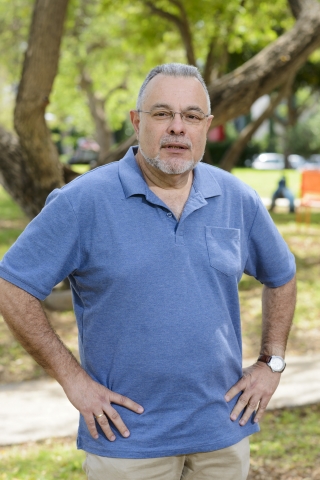A gene for calm
Briefs

Everyone experiences anxiety—but we all know that some people are more naturally anxious than others. Now, researchers at the Weizmann Institute of Science have revealed a previously unknown molecular mechanism underlying anxiety. The discovery could aid in the search for new classes of drugs capable of alleviating the symptoms of anxiety disorders.
Dr. Nicolas Panayotis, a postdoctoral fellow in the lab of Prof. Mike Fainzilber in the Department of Biomolecular Sciences, was curious about the role of importins—proteins that shuttle molecules into the nucleus from other areas in the cell. Seeking to understand the role these proteins play in the brain and spinal cord, Dr. Panayotis and his colleagues examined mice that had been engineered to lack genes from a particular importin subfamily. They discovered that one gene—the one encoding the protein called importin alpha-5—had a major effect on anxiety levels. Mice missing this gene were far less anxious than the controls.
Examining gene expression in the brains of these “calm” mice, the scientists found that, in the absence of importin alpha-5, a protein called MeCP2 did not enter the nucleus of neurons in the hippocampus. Then, like a machine set into motion, this process modified expression of certain genes, including one involved in the production of a molecule called S1P—an exciting finding since drugs that modulate S1P signaling already exist.
The Fainzilber group treated normal mice with a multiple sclerosis (MS) drug known to affect S1P signaling, and found that the drug produced a calming effect—something that had been reported before as an unexpected side-effect of MS treatment. This indicates that S1P targeting could potentially be built into new anti-anxiety medications.
The discovery of importin alpha-5 as a key anxiety regulator may have significant implications for future medical treatments. “In follow-up research, we have already identified a number of drug candidates that might someday be employed for treating anxiety in human patients,” says Prof. Fainzilber.
Prof. Mike Fainzilber is supported by the Dr. Miriam and Sheldon G. Adelson Medical Research Foundation, the Estate of Florence and Charles Cuevas, the European Research Counci, Mr. and Mrs. Lawrence Feis, the Laraine and Alan A. Fischer Laboratory for Biological Mass Spectrometry, the Estate of Lilly Fulop, The Moross Integrated Cancer Center, the Rising Tide Foundation, and the Zuckerman STEM Leadership Program. Prof. Fainzilber is the incumbent of the Chaya Professorial Chair in Molecular Neuroscience.

Prof. Mike Fainzilber








